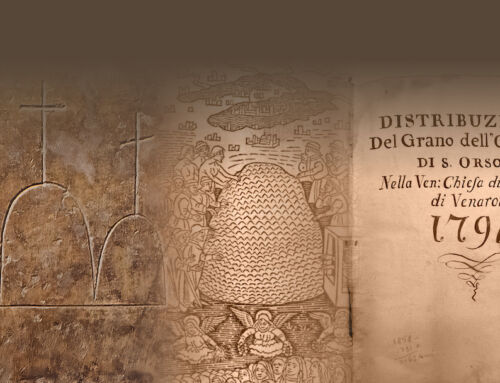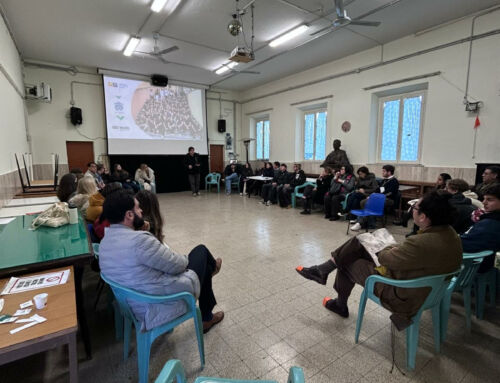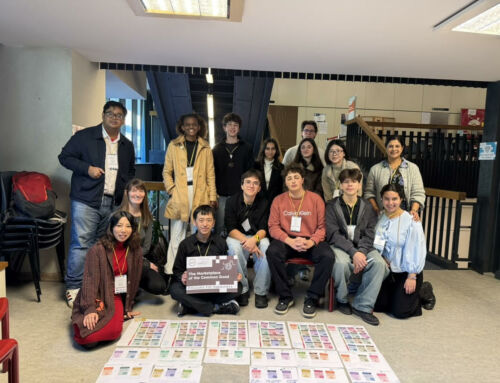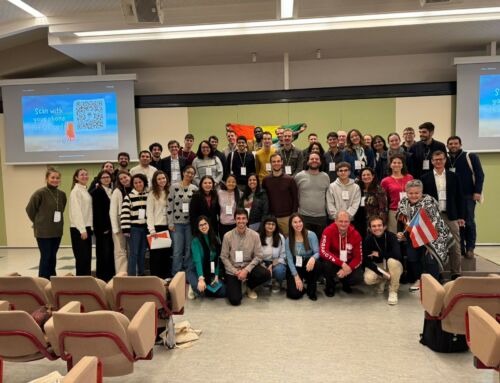Interview with Gabriele Costa B. Garcia, from Think Twice Brasil, and an active member of the EoF Community
by EoF staff
- Can you tell us a bit about yourself and your background?
I am a Brazilian dreamer and mother of a 3-year-old boy called Francisco. I was raised in a Catholic middle-class family, and from a very young age, I was already engaged in volunteer activities. I graduated in law and worked for a traditional law firm for ten years, until 2013, when I quit my job to found Think Twice Brasil – TTB.
- What inspired you to become involved in social impact work, particularly in the field of human rights and peace education?
During the time I was working as a lawyer, I became responsible for many pro-bono causes (supporting nonprofit organisations for free). This experience led me to very vulnerable communities and started questioning myself about how my work was contributing to making people’s lives better. Saint Francis of Assisi, became my spiritual guide at this time, due to the influence of my grandmother, Wilma, who gifted me a wooden plaque with his Morning Prayer. I realised that I wished to fully dedicate myself to tackling inequalities and violences. I assume that we are doing very wrong because we didn’t learn to think, act, and do differently. Violences and inequalities are interconnected and reinforced by a web of ignorance and fear, so education for peace and human rights can offer people an alternative to how to build a world that they never imagined could be possible.
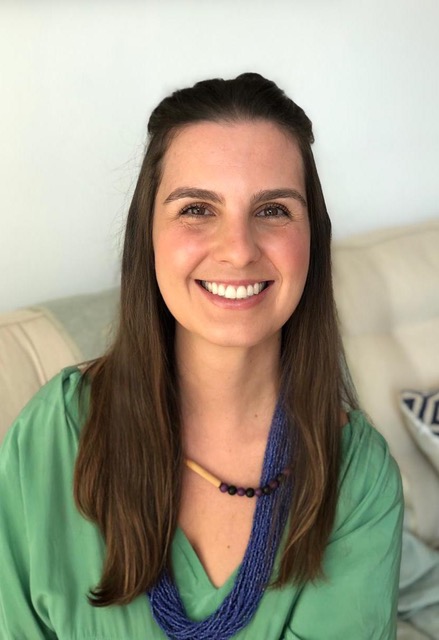
The involvement with The Economy of Francesco
- How did you first encounter The Economy of Francesco initiative, and what motivated you to engage with it?
I learned about EoF in 2019 just after the movement was launched. I felt called by the wise and courageous words of Pope Francis, especially considering the very polarized atmosphere of Brazil at the time.
I first joined the Policies and Happiness Village, but my connection with EoF got deeper when I participated in the International Summer Course in La Verna, in June 2023. The amazing EoF staff allowed me to join the course along with Felipe, my husband and also my son, Francisco, who became the youngest EoF participant. It was a magical week, with meaningful connections and reflections, that revealed to me the experience of belonging to a beloved community.
- What role do you see initiatives like EoF playing in addressing social and economic inequalities globally?
The majority of the leaders of EoF I know merge deep knowledge about a particular subject, openness to new ideas and reflections, and willingness to serve. This unique combination of humbleness and commitment to service leads EoF to be a movement that starts outside the people but soon becomes embodied. The systemic changes needed will only be achieved by collective efforts, and EoF movements are a catalytic way to articulate people who are already committed to something bigger than themselves.
Introduction to Think Twice Brasil (TTB)
- Could you provide an overview of Think Twice Brasil (TTB) and its mission?
TTB is a social impact organisation that promotes education for Peace and Human Rights. More than 12.000 people across all continents already experienced our learning journeys. Our mission is to support people and organisations in breaking the cycles of violence and inequality by promoting education for peace and human rights.
We create our projects based on what we call “Political Spirituality”, which is the merging of spiritual and political knowledge to support people to reconcile with their own stories while taking responsibility for tackling the social structures that cause individual and collective suffering.
- What inspired the creation of TTB, and what are some of the key projects or initiatives it has undertaken since its inception?
As a society, we naturalize violence, we fail to identify it and we are unaware of how to behave and relate non-violently. Above that, violence and inequality are interdependent, so our ignorance about recognizing violence impacts also our capacity to perceive inequality as a form of violence itself.
TTB works with education, research and strategies to promote peace and human rights, aiming to train people to be capable of identifying different forms of violence and transforming behaviours and relationships that generate individual and collective suffering.
Among our several projects is the Escola de Mudadores (School of Changers), which is a pioneer free digital platform with video classes and support material to facilitate the dialogue about peace and human rights between young people and educators in Brazil. We also promote the Women, Peace, and Security Agenda, supporting local leaders to rethink peace and security, by shifting the dynamics from controlling people to caring about them. Finally, we also support schools, public institutions and civil society organisations to reframe or create policies and processes to promote a culture of peace and non-violence.
Discussion on the study “Algorithms, Violence, and Youth in Brazil”
- Your recent study, “Algorithms, Violence and Youth in Brazil: towards an educational model for peace and human rights,” sheds light on several aspects, such as the impact of violent content on social media. Could you briefly discuss the key findings of the study?
Among the findings is the fact that young people noted that exposure to violent content has contributed to the normalization of violence, especially in its more grotesque forms, and also led them to an addiction to this type of content. The youth’s capacity to be empathetic was also affected and watching violent content repeatedly is considered a sign of power and resistance.
Also, there are extensive recommendations for videos reinforcing gender and racial stereotypes, as well as portraying immigrants, homosexuals, autistic people and other individuals as targets of discrimination. However, digital violence is only a layer of the structural violence perceived in other spaces.
The lack of knowledge about how violence can be manifested prevents people from recognizing it, locking them in vicious cycles of violence for themselves and others. To face this problem, we propose a critical education for peace and human rights, that may support people in becoming aware of the violence dynamics and equipping them with the concepts and tools needed to break the cycles.
- How do you envision the findings of this study contributing to efforts aimed at promoting peace education and human rights awareness among youth?
I hope this study can reinforce the need to take education for peace and human rights as an urgent public policy for preventing violence. As important as calculating and writing is knowing how to relate and identify violations that can cause individual and collective suffering, equipping people to break the cycles of violence. It is a whole society effort, but also a human right that should be guaranteed by the States.
The study is accompanied by Support Material for Educators on Violence and Culture of Peace, offering concepts and tools to discuss the topic in the classroom, and also a Chat Card Game for the whole family to reunite, have fun and reflect on it.
Future direction (and some advice)
- Looking ahead, what are your hopes and aspirations for the future of TTB and its impact on society?
For the past ten years, we have been leading a silent revolution of non-violence, inviting people to uncomfortable reflections about themselves and society, and kindly encouraging them to raise their spiritual and political knowledge to stand up for peace and human rights. We are particularly focused on public servers, educators, and civil society leaders.
In the next 10 years, we hope to deliver our learning journeys to at least 5 million people in Brazil and America, unleashing the Global South’s wisdom and supporting people and organisations to embody non-violence as a core element to promote peace, security, and prosperity to all.
- How do you see TTB evolving to meet the changing needs and challenges in the field of human rights education and peacebuilding?
We are proud to work in close collaboration with civil society organisations and we are active members of important movements, such as the EoF, the Dalai lama Fellows, the Ashoka Spiritual Changemakers, and the WASL – Women’s Alliance for Security Leadership. We believe that collaboration is key to amplifying the impact of our work and also guaranteeing diverse and complementary perspectives about common subjects.
Besides having collaboration as a strategic guideline for us, we also envision investigating how technology can be better used to promote peace and human rights education, once we already know a lot about how technology can threaten peace and human rights.
- For individuals interested in making a difference in their communities or addressing social issues, what advice would you offer based on your own experiences?
My number one suggestion is to seek people and communities that share the same values and purposes. For many of us, when we start thinking about committing ourselves to making a change, the path can be very lonely and many people discourage us. So it is important to have a community that can support us in many ways.
Secondly, but equally important, is to be critical about the content you consume and the communities you take part. Some narratives may appear very appealing, but if these narratives lead people to judge, segregate, discriminate, or violate others, this is not the right path to take. We all seek to belong, so stay awake and critical to not engage with content and groups that make you belong by causing suffering to others.
Finally, create space and time to strengthen your faith in yourself, in humanity, and in any other force you may believe in. You can do it by reading, meditating, exercising your deep listening, volunteering, writing, being conscious about your feelings and behaviours and even investigating your own story. The faith is a key component to keep us dreaming. And we can only create something if we were first able to dream of it.


